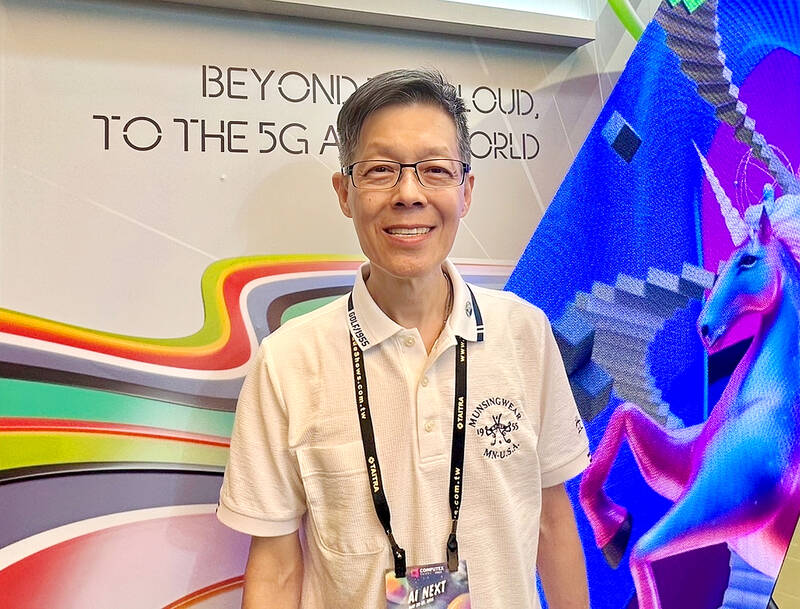Quanta Computer Inc (廣達), which supplies artificial intelligence (AI) servers powered by Nvidia Corp’s chips, yesterday said server revenue would grow steadily in the coming quarters, with sales of AI and general servers expected to grow by a double-digit percentage this year from last year.
Shipments of servers equipped with Nvidia’s GB200 chips, which began at the end of March, are expected to remain steady this quarter, while shipments of GB300 servers are expected to begin in the second half of the year at the earliest, said a Quanta official, who declined to be named.
The company earlier this month said it would increase capital expenditure by about 40 percent year-on-year to NT$20 billion (US$663.17 million) to meet rising server demand from major cloud service providers.

Photo: Fang Wei-chieh, Taipei Times
From researching GPU computing to advancing AI technologies, Quanta and Nvidia have built a new industry and are driving global change, with Taiwan’s innovation ecosystem at the heart of the revolution, Quanta Cloud Technology Inc (QCT, 雲達) president Mike Yang (楊麒令) said on Tuesday.
QCT is a server subsidiary of Quanta.
Nvidia cofounder and chief executive officer Jensen Huang (黃仁勳), who visited QCT’s booth at the Computex trade show in Taipei on Tuesday, referred to the two companies’ collaboration as the beginning of a new journey and a reset of the computer industry that took 60 years to build.
The information technology industry is already massive, but tech firms have reset the playing field, potentially expanding it 10-fold, Huang said.
“The opportunity in front of us is genuinely extraordinary,” he said.
Taking the GB300 server, which comprises 1.2 million parts, as an example, Huang said it is a complete data center built and tested at QCT, so customers can simply plug it in upon delivery.
“This is not a server for a data center. This is a supercomputer for an AI factory, which is the reason why the more you buy, the more you make,” he said.

In Italy’s storied gold-making hubs, jewelers are reworking their designs to trim gold content as they race to blunt the effect of record prices and appeal to shoppers watching their budgets. Gold prices hit a record high on Thursday, surging near US$5,600 an ounce, more than double a year ago as geopolitical concerns and jitters over trade pushed investors toward the safe-haven asset. The rally is putting undue pressure on small artisans as they face mounting demands from customers, including international brands, to produce cheaper items, from signature pieces to wedding rings, according to interviews with four independent jewelers in Italy’s main

Japanese Prime Minister Sanae Takaichi has talked up the benefits of a weaker yen in a campaign speech, adopting a tone at odds with her finance ministry, which has refused to rule out any options to counter excessive foreign exchange volatility. Takaichi later softened her stance, saying she did not have a preference for the yen’s direction. “People say the weak yen is bad right now, but for export industries, it’s a major opportunity,” Takaichi said on Saturday at a rally for Liberal Democratic Party candidate Daishiro Yamagiwa in Kanagawa Prefecture ahead of a snap election on Sunday. “Whether it’s selling food or

CONCERNS: Tech companies investing in AI businesses that purchase their products have raised questions among investors that they are artificially propping up demand Nvidia Corp chief executive officer Jensen Huang (黃仁勳) on Saturday said that the company would be participating in OpenAI’s latest funding round, describing it as potentially “the largest investment we’ve ever made.” “We will invest a great deal of money,” Huang told reporters while visiting Taipei. “I believe in OpenAI. The work that they do is incredible. They’re one of the most consequential companies of our time.” Huang did not say exactly how much Nvidia might contribute, but described the investment as “huge.” “Let Sam announce how much he’s going to raise — it’s for him to decide,” Huang said, referring to OpenAI

The global server market is expected to grow 12.8 percent annually this year, with artificial intelligence (AI) servers projected to account for 16.5 percent, driven by continued investment in AI infrastructure by major cloud service providers (CSPs), market researcher TrendForce Corp (集邦科技) said yesterday. Global AI server shipments this year are expected to increase 28 percent year-on-year to more than 2.7 million units, driven by sustained demand from CSPs and government sovereign cloud projects, TrendForce analyst Frank Kung (龔明德) told the Taipei Times. Demand for GPU-based AI servers, including Nvidia Corp’s GB and Vera Rubin rack systems, is expected to remain high,